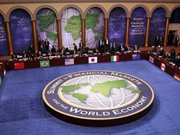Jobs central to pulling world economy out of the danger zone

The International Monetary Fund and the World Bank admit that the global economy has entered a grim new “danger zone” where a double dip recession is increasingly becoming likely.
UNI, ITUC, TUAC and other union leaders will meet with Labour Ministers on the fringes of the G20 Labour and Employment Ministers gathering in Paris and demand that jobs not cuts are the way out of the crisis.
This is the message that the Labour ministers must take from Paris to the G20 Finance Ministers and Leaders at the full G20 meeting in Cannes in November. Philip Jennings, General Secretary, UNI Global Union is representing UNI at both G20 summits.
Jennings said, “Workers’ rights and job creation are key to a recovery. President Obama had it right when he said that collective bargaining should be part of a drive towards a fairer and more just economy. However the reality is that the G20’s negligent procrastination and limited ambition has once again opened the door to greed and self-interest amongst the banking fraternity while tens of millions faced wage cuts, job losses and poverty.”
“You only have to look at the debt crisis in Greece to see that the current fiscal consolidation polices based exclusively on deficit reduction are failing ordinary workers and families. Growth and jobs go hand in hand but the G20 leadership led by France is not showing the political will to create a co-ordinated action plan. If we are not careful it will not only be Greece that will be led up the steps to face the guillotine and the final cut delivered by the bond marketers. And it will be the people who will be left holding the basket containing the remains of the severed economy.”
The unions are calling on the G20 Employment and Labour Ministers to put workers’ rights and jobs at the centre of a coordinated recovery programme and implement it. Specifically the unions are demanding:
· A G20 Working Group on Employment and Social Protection be set up;
· Investment in infrastructure and green jobs, skills development and other active labour market policies;
· Governments develop alternative sources of finance to provide funding for employment policies by making domestic taxation more progressive, tackling tax evasion, introducing a Financial Transactions Tax (FTT) and Eurobonds for the Eurozone;
· And the launch of a G20 “Youth Pact” guaranteeing young people quality employment or education and training.
Read the full Global Unions’ Statement to the G20 Employment and Labour Ministers’ Meeting by clicking "Related Files" tab at the top of the page.

